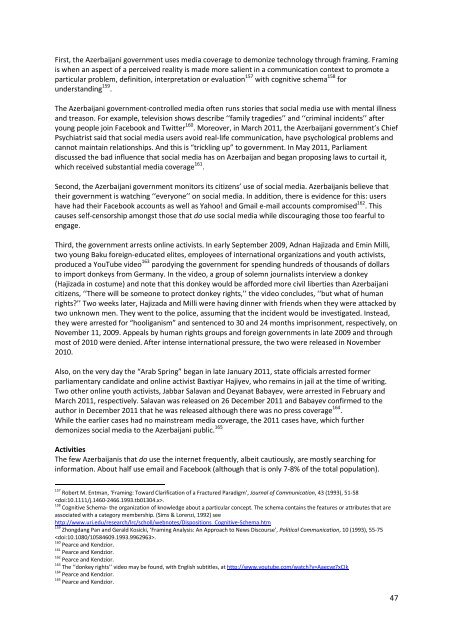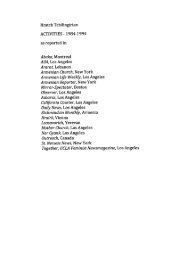Download Spotlight on Azerbaijan - Foreign Policy Centre
Download Spotlight on Azerbaijan - Foreign Policy Centre
Download Spotlight on Azerbaijan - Foreign Policy Centre
Create successful ePaper yourself
Turn your PDF publications into a flip-book with our unique Google optimized e-Paper software.
First, the <strong>Azerbaijan</strong>i government uses media coverage to dem<strong>on</strong>ize technology through framing. Framing<br />
is when an aspect of a perceived reality is made more salient in a communicati<strong>on</strong> c<strong>on</strong>text to promote a<br />
particular problem, definiti<strong>on</strong>, interpretati<strong>on</strong> or evaluati<strong>on</strong> 157 with cognitive schema 158 for<br />
understanding 159 .<br />
The <strong>Azerbaijan</strong>i government-c<strong>on</strong>trolled media often runs stories that social media use with mental illness<br />
and treas<strong>on</strong>. For example, televisi<strong>on</strong> shows describe ‘‘family tragedies’’ and ‘‘criminal incidents’’ after<br />
young people join Facebook and Twitter 160 . Moreover, in March 2011, the <strong>Azerbaijan</strong>i government’s Chief<br />
Psychiatrist said that social media users avoid real-life communicati<strong>on</strong>, have psychological problems and<br />
cannot maintain relati<strong>on</strong>ships. And this is “trickling up” to government. In May 2011, Parliament<br />
discussed the bad influence that social media has <strong>on</strong> <strong>Azerbaijan</strong> and began proposing laws to curtail it,<br />
which received substantial media coverage 161 .<br />
Sec<strong>on</strong>d, the <strong>Azerbaijan</strong>i government m<strong>on</strong>itors its citizens’ use of social media. <strong>Azerbaijan</strong>is believe that<br />
their government is watching ‘‘every<strong>on</strong>e’’ <strong>on</strong> social media. In additi<strong>on</strong>, there is evidence for this: users<br />
have had their Facebook accounts as well as Yahoo! and Gmail e-mail accounts compromised 162 . This<br />
causes self-censorship am<strong>on</strong>gst those that do use social media while discouraging those too fearful to<br />
engage.<br />
Third, the government arrests <strong>on</strong>line activists. In early September 2009, Adnan Hajizada and Emin Milli,<br />
two young Baku foreign-educated elites, employees of internati<strong>on</strong>al organizati<strong>on</strong>s and youth activists,<br />
produced a YouTube video 163 parodying the government for spending hundreds of thousands of dollars<br />
to import d<strong>on</strong>keys from Germany. In the video, a group of solemn journalists interview a d<strong>on</strong>key<br />
(Hajizada in costume) and note that this d<strong>on</strong>key would be afforded more civil liberties than <strong>Azerbaijan</strong>i<br />
citizens, ‘‘There will be some<strong>on</strong>e to protect d<strong>on</strong>key rights,’’ the video c<strong>on</strong>cludes, ‘‘but what of human<br />
rights?’’ Two weeks later, Hajizada and Milli were having dinner with friends when they were attacked by<br />
two unknown men. They went to the police, assuming that the incident would be investigated. Instead,<br />
they were arrested for “hooliganism” and sentenced to 30 and 24 m<strong>on</strong>ths impris<strong>on</strong>ment, respectively, <strong>on</strong><br />
November 11, 2009. Appeals by human rights groups and foreign governments in late 2009 and through<br />
most of 2010 were denied. After intense internati<strong>on</strong>al pressure, the two were released in November<br />
2010.<br />
Also, <strong>on</strong> the very day the “Arab Spring” began in late January 2011, state officials arrested former<br />
parliamentary candidate and <strong>on</strong>line activist Baxtiyar Hajiyev, who remains in jail at the time of writing.<br />
Two other <strong>on</strong>line youth activists, Jabbar Salavan and Deyanat Babayev, were arrested in February and<br />
March 2011, respectively. Salavan was released <strong>on</strong> 26 December 2011 and Babayev c<strong>on</strong>firmed to the<br />
author in December 2011 that he was released although there was no press coverage 164 .<br />
While the earlier cases had no mainstream media coverage, the 2011 cases have, which further<br />
dem<strong>on</strong>izes social media to the <strong>Azerbaijan</strong>i public. 165<br />
Activities<br />
The few <strong>Azerbaijan</strong>is that do use the internet frequently, albeit cautiously, are mostly searching for<br />
informati<strong>on</strong>. About half use email and Facebook (although that is <strong>on</strong>ly 7-8% of the total populati<strong>on</strong>).<br />
157 Robert M. Entman, ‘Framing: Toward Clarificati<strong>on</strong> of a Fractured Paradigm’, Journal of Communicati<strong>on</strong>, 43 (1993), 51-58<br />
.<br />
158 Cognitive Schema- the organizati<strong>on</strong> of knowledge about a particular c<strong>on</strong>cept. The schema c<strong>on</strong>tains the features or attributes that are<br />
associated with a category membership. (Sims & Lorenzi, 1992) see<br />
http://www.uri.edu/research/lrc/scholl/webnotes/Dispositi<strong>on</strong>s_Cognitive-Schema.htm<br />
159 Zh<strong>on</strong>gdang Pan and Gerald Kosicki, ‘Framing Analysis: An Approach to News Discourse’, Political Communicati<strong>on</strong>, 10 (1993), 55-75<br />
.<br />
160 Pearce and Kendzior.<br />
161 Pearce and Kendzior.<br />
162 Pearce and Kendzior.<br />
163 The ‘‘d<strong>on</strong>key rights’’ video may be found, with English subtitles, at http://www.youtube.com/watch?v=Aaecvg7xCIk<br />
164 Pearce and Kendzior.<br />
165 Pearce and Kendzior.<br />
47





